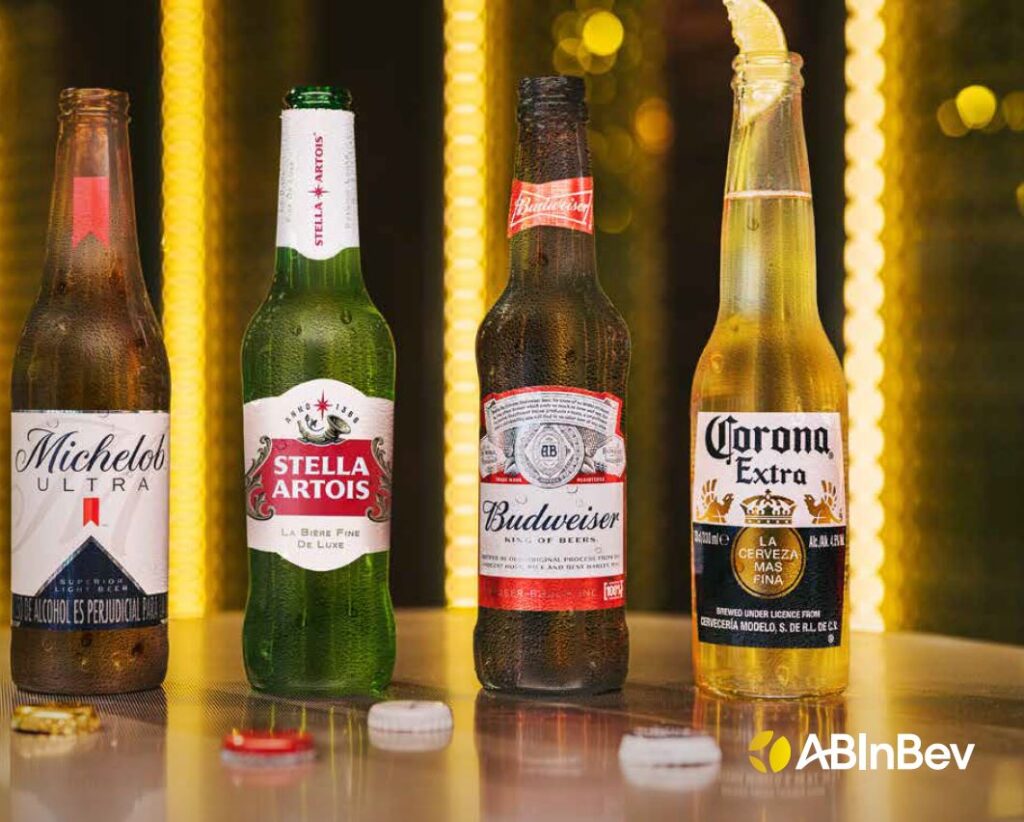Navigating Brand Reputation and Consumer Trust
In this blog post, we delve into Anheuser-Busch InBev’s approach to managing its expansive brand portfolio with a keen focus on sustainability, transparency, and ethical practices. Exploring these elements is crucial for understanding the significance of brand reputation in today’s environmentally and socially conscious market.
Busch InBev (AB InBev), as the world’s largest brewer, is a paragon of successful brand portfolio management in the global beverage industry. Owning well-known names like Budweiser, Stella Artois, and Corona, the company faces unique opportunities and challenges in managing its extensive brand portfolio under the scrutinizing lens of environmental, social, and governance (ESG) criteria and reporting standards.
Brand Reputation and Consumer Influence
AB InBev’s reputation is built on a foundation of quality, innovation, and scale. However, in an era where consumers are increasingly concerned with corporate responsibility, maintaining consumer trust is paramount. Consumers today are keenly aware of the environmental and social impacts of their purchases and have a considerable influence over AB InBev’s reputation. Their preferences for environmentally friendly and ethically produced beverages guide the company’s policies and practices. Although the company has faced criticism and challenges in managing their activities across different countries, AB InBev has responded by integrating sustainability into its core business strategy. The company has committed to ambitious goals, such as achieving a 25% reduction in CO2 emissions across its value chain by 2025, reflecting its alignment with consumer expectations and enhancing its brand reputation. As of March 29th, 2024, AB InBev is ranked by Sustainalytics (a Morningstar company) as ‘Medium Risk’ in the ESG Risk Rating: https://www.sustainalytics.com/esg-rating/anheuser-busch-inbev-sa-nv/1008623503. This indicates some room for improvement in managing the brand’s activities towards responsible and sustainable business practices.

Image source: AB InBev Annual Report 2023
Managing Brands in an Era of Accountability
Transparency and accountability are cornerstones of AB InBev’s brand management strategy. The company actively discloses its progress on sustainability initiatives through detailed annual reports and engages with stakeholders through forums and partnerships. This transparency is crucial for managing a diverse portfolio where each brand must uphold the overarching corporate values while catering to specific market needs. AB InBev’s global influence necessitates a consistent and clear approach to corporate responsibility, making its efforts in transparency a benchmark for the industry. The company’s rankings in ESG criteria by agencies such as Morningstar underscore its commitment to accountability. These rankings are based on rigorous assessments of the company’s handling of environmental impacts, social responsibility, and governance structures. AB InBev leverages these assessments to guide its brand strategies, ensuring that each brand under its umbrella not only meets market demands but also contributes positively to its ESG and Sustainable Development Goals (SDG).
Assessing AB InBev’s Brand Portfolio Management
Managing a portfolio as large and diverse as AB InBev’s requires a nuanced approach to ensure that all brands not only coexist but thrive. The company employs a multi-brand strategy that allows each brand to articulate its unique identity while supporting the broader corporate mission. This strategy is evident in how each brand tailors its marketing and product development to regional preferences and trends, yet all align with core commitments to quality and sustainability. This management of distinct but unified brands under one corporate umbrella enables AB InBev to maximize market penetration and consumer loyalty.
Considerations in Building and Maintaining a Brand’s Reputation
AB InBev has faced various reputational challenges, including anti-competitive practices, environmental concerns over water usage, controversial advertising campaigns, and labor disputes. The company has responded by aligning its business practices with legal and ethical standards, investing in water stewardship, refining its advertising strategies to promote responsible drinking, and improving labor conditions and relations with unions. These actions demonstrate AB InBev’s commitment to continuous improvement and responsible corporate behavior, contributing to industry standards for corporate responsibility.
Conclusion: Enhancing AB InBev’s Brand Reputation
To further strengthen its brand reputation, AB InBev could adopt the following strategies:
- Deepen community engagement: Intensify efforts to connect with local communities through initiatives that support local economies and preserve cultural heritage.
- Enhance visibility of sustainability achievements: Use innovative marketing strategies to better highlight the company’s environmental and social initiatives, making these efforts more visible to the consumer.
- Leverage technology for better consumer insights: Implement advanced analytics to gain deeper insights into consumer behavior, enabling more precise adjustments to product offerings and marketing tactics.
- Expand partnerships with environmental organizations: Collaborate more extensively with global and local environmental organizations to co-create sustainability projects.
- Strengthen global and local brand alignment: Ensure that global sustainability goals are effectively integrated into local brand strategies, maintaining coherence across the portfolio.
By implementing these strategies, AB InBev can continue to enhance its reputation, ensuring it remains a leader in the beverage industry through responsible and responsive brand portfolio management.